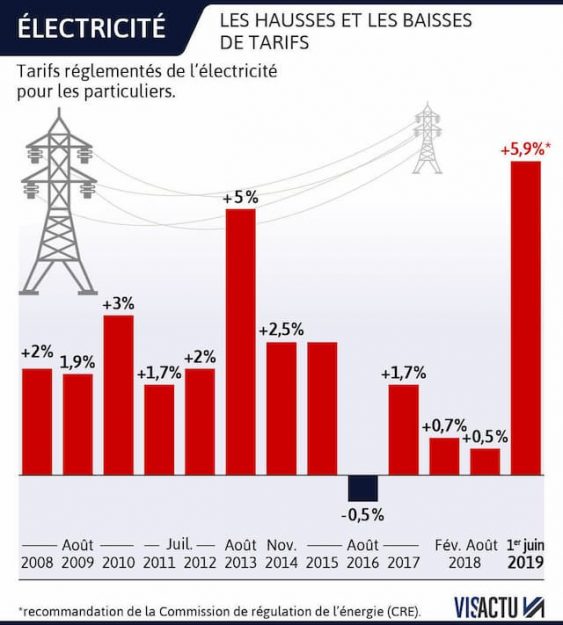Increase in the Price of Electricity from Today. Since 2007, Prices Have Increased by 50%

On June 1st, electricity rates will increase by 5.9%, the 10th increase in 10 years. A study by INSEE shows that since 1960, electricity has become an increasingly important part of the household budget.
The regulated electricity tariff, applied by EDF to approximately 25 million households, increases by 5.9% as from 1 June 2019 . The government recently announced its intention to change the way fare is calculated next year . On Wednesday, the Minister of the Ecological Transition François de Rugy estimated that the rise in electricity tariffs scheduled for Saturday was due in particular to the drift of EDF’s production costs in recent years.
An INSEE study published in April shows the evolution of the impact of electricity prices for households from 1960 to 2016. In 2016, households’ electricity consumption was 28 billion euros. euros, ie a physical consumption of 161 TWh.
This expenditure represented 2.3% of the household consumption budget, ie € 960 on average per household and per year. Since 1960, household spending on electricity has increased in value by 9.0% on average per year, compared to 7.3% for all of their consumption.
On the rise since 2007
From 1960 to 1973, electricity tariffs increased on average by 1% per year, while consumer prices rose more rapidly, averaging 4.8% per year. The oil tanker crash of 1973 scares prices: rising fossil fuel costs push up electricity and consumer prices. From 1986 to 2007, because of the lower cost of nuclear electricity and its disconnection of hydrocarbon prices, the rise in the price of electricity remains very moderate: + 2.7%.
Taxes and levies
Since 2008, the price of electricity has risen faster than inflation: + 4.3% per year on average against + 0.5%. INSEE explains this rise by a sharp increase in taxes and levies over this period, including the five-fold increase in the contribution to the public electricity service (CSPE).
Although electricity prices in France remain below the European average , they have nevertheless increased by 50% since 2007. The rise of 1 June is the 12th since 2008, and the highest percentage:

INSEE estimates that the 50% increase in the cost of electricity also leads to an increase in overall consumer prices of around 1.5%.
The government and EDF are sending the ball to explain this rise . For the Minister of Ecological Transition François de Rugy, “the costs of producing electricity in France have drifted for years” . For the CEO of EDF, Jean-Bernard Lévy, “we tax energy a lot” .
The share of taxes and levies in the total price of electricity in France has indeed increased from 26% in 2010 to 35% in 2016. A trend that can be found in all countries of the European Union, where the share of taxes increases from 28% in 2010 to 36% in 2016.
Enjoyed this? Get the week’s top France stories
One email every Sunday. Unsubscribe anytime.


